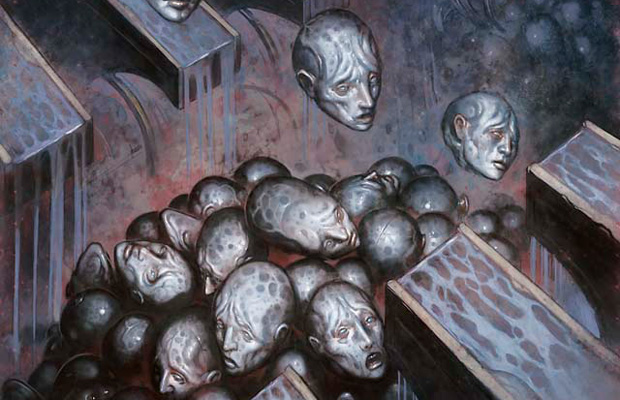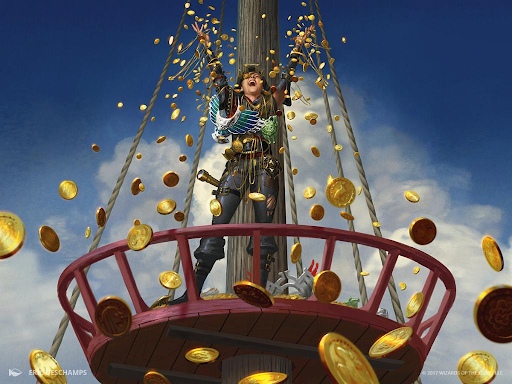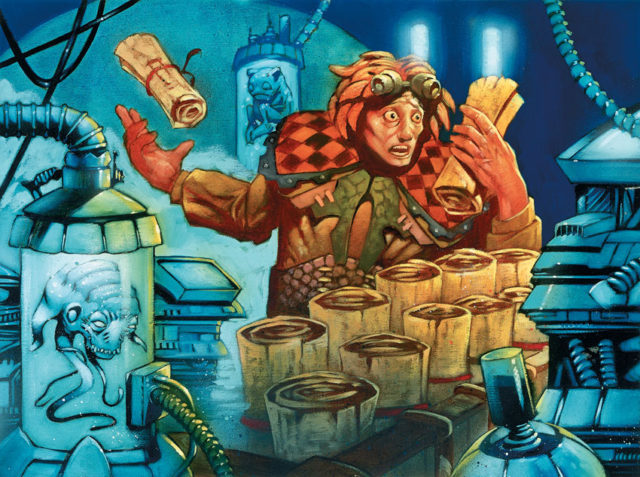Cover image: Happily Ever After by Matt Stewart
Welcome back to Part 2 of the Players’ Guide to Commander Win Conditions. In this article series, we talk about how they work, and how your opponents will feel about facing them down. Last week, we talked about creature combat, infinite combos, and “I Win” cards. For Part 2, we’ll get into the less conventional ways to win. While they’re less common in Commander, they still provide an engaging challenge for players to tackle.

Armageddon by Chris Rahn
Prison Effects and Resource Denial
Commander is filled with fun, powerful cards, but not every card is both fun and powerful. I’m referring to the whole host of cards designed to lock down a game, or reduce the pace of play to a crawl. Before we go any further, the big disclaimer here is that a lot of Commander players have strong opinions on prison, “stax,” resource denial, or whatever you want to call it. These cards are effective at preventing people from playing the game, which goes against many players’ philosophy of why they play Commander. Nevertheless, if you’re in a playgroup that is okay with it, these effects can and will win games.
One of the most emblematic cases of resource denial is mass land destruction. This can often be a win condition when it’s used to set a player up for a slow, grindy victory. If you’re ahead on board with more creatures, or more value-generating artifacts, then blowing up all lands can keep you there. Your opponents might be stuck waiting for lands, while you slowly move forward towards victory. Armageddon is the knockout punch, and can sometimes warrant a concession right then and there. For further reading on mass land destruction, Kristen took a deeper dive into the nuances and the responsibility it carries.
Similar to this are cards like Blood Moon and Hall of Gemstone, which punish multicolor decks that run lots of mana-fixing lands. Resource denial can also come in the form of mass discard effects, such as Sire of Insantiy, or Narset, Parter of Veils plus Windfall. These effects don’t cause players to lose outright, but they can effectively eliminate their chance to win.
Other cards in this vein are rule setting pieces, like Drannith Magistrate, Ensnaring Bridge, and Deafening Silence. While they don’t win a game on their own, they can support a prison deck’s approach to shutting their opponents down. Some opponents will scoop by the time a hard lock is achieved, others will bide their time and try to break themselves out of it.
If you’re the prison deck pilot, it’s important to remember that some folks won’t give up until you’ve given them a strong enough reason to. No one is forcing them to concede, so they have every right to make you take them down in the process. Since your victory might not come from winning in the traditional sense, but rather causing your opponents to give up, then locking the board down is only part of the equation. Because of this, it’s not unusual for a prison deck to have their win condition be part combo-based, such as pairing Helm of Obedience with Rest in Peace.
Since prison effects and resource denial are only considered fun by some players, it helps to talk this over with your playgroup before bringing this kind of deck to the table. There’s a place for every strategy in Commander, but you might need to be more selective over where you take these kinds of decks.

Mind Funeral by rk post
Mill
Ever since Millstone came out in Antiquities, people have been trying to get their opponents to run out of cards. However, milling your opponents out is still a rarity in Commander. It requires mill cards that affect all of your opponents, instead of just one. That limits the depth of card options that Mill players have. Also, in a social format like Commander, Mill suffers from being a non-interactive play style. It doesn’t care what your opponents are doing on board—it only cares about how many cards are still in their library. That leads to some linear, predictable play patterns, which may cause a player to lose interest in this direction.
Despite these challenges, Mill remains one of the more beloved niche strategies for winning. Ryan Sainio is a veteran of the archetype, and put out a comprehensive article on the state of Mill in Commander today. You can go all-in with commanders like Phenax, God of Deception or Bruvac the Grandiloquent, or have Mill as a backup plan to something else. In games with lots of wheel effects, a Mill victory can show up completely by accident. Any card that has “Target player draws X cards” becomes more relevant in those situations. A Blue Sun’s Zenith or Damnable Pact looks a lot different when it can be used as a weapon.
Adjacent to Mill, there are self-mill strategies that win off of cards like Thassa’s Oracle. This is currently a leading strategy in cEDH. Players cast a card like Demonic Consultation or Hermit Druid, in the interest of getting rid of their library as soon as possible. This aggressive combo approach is not normally found in more casual circles, due to the speed at which it can happen. While you might see a self mill payoff in casual circles, they’re often used as a backup plan, such as Laboratory Maniac in a Nekusar, the Mindrazer deck.

Revel in Riches by Eric Deschamps
Alternate Win Conditions
If you want to step into the world of pure imagination, then you’re only one Scryfall search away. Alternate win conditions create a sort of game within a game, as players seek to satisfy the conditions on the card. They can be complex like Mechanized Production, or simple like Test of Endurance. Regardless, these cards can offer an exciting way to shake up the flow of a game. All it takes is one Felidar Sovereign to turn a game on its head. They also act as a backup plan for a deck, in case their primary path is blocked. In her article about alternate win conditions, Kristen expands upon this dynamic, and how it can make your games flow smoother.
Alternative win conditions can come with their own host of challenges, though. As stated in their title, they’re viewed as an alternative to traditional paths to victory. If you build a deck that relies solely on these to win, it can feel fragile and unpredictable. Also, it changes what cards you can win or lose against. Path to Exile won’t stop an army of plant tokens created by Avenger of Zendikar, but it can stop you from winning off of Azor’s Elocutors.
Adjacent to cards that say “you win the game,” there’s a smaller list of cards like Door to Nothingness that make your opponents lose. These require similar hoops to jump through, but will only pick off one player at a time. If you want an experience without the chance of “Oops, I win!” moments, then these might be the alternative win conditions for you. Similar to Commander damage, these cards help get through infinite life combos, or defensive pillowfort decks.
Alternate win conditions can suffer from a sort of “bucket list” effect. After you win with Revel in Riches, you might find yourself checking the box off and cutting it for a different card. There are only so many times you can jump through the same hoops before it gets tired. It helps to go in knowing that it might not fall in love with the feeling of winning like this, and that’s okay. You’ll definitely have a good story to tell.

Frantic Search by Jeff Miracola
The MacGyver
Sometimes, you have to assemble a path to victory with a handful of tools at your disposal. For instance, I once won a game by using Riku of Two Reflections to copy a kicked Rite of Replication, targeting Bogardan Hellkite. These can be some of the most challenging, yet rewarding ways to win a game of Commander. They represent the times where we have to think on our feet, and they can be a testament to our problem-solving skills as players.
How and when we end up in these situations are nearly impossible to predict, so there really isn’t a way to plan for them. Instead, we can work on our ability to analyze problems in front of us, and how we formulate a winning direction. Your commander can often have a role in this process, since they’re always one cast away.
In all of the discussion on optimization and deck building, it’s easy to forget just how many games are decided by last-ditch efforts like this. They may not always be pretty, but they can get the job done.

Fortunate Few by Jesper Ejsing
A Win is a Win, Right?
Some wins can be immensely gratifying; a testament to our skill as players. Others can feel like we escaped by the skin of our teeth. Few games offer as many different paths to victory, so it’s easy to get swept up in all the possibilities. While winning almost always feels good, it’s important to remember that not all losses feel the same. Commander is a place where the shared experience is often more important than the outcome. So, it’s up to individual playgroups to work out what feels best for them. Unless you’re the kind of person to play Divine Intervention or Celestial Convergence, someone has to win. You might as well go for it if you have the chance.
Travis is a Virginia-based player and writer, who has been turning things sideways since Starter 1999. He primarily plays Commander, Pauper, and Legacy, and has a passion for introducing new players to the game. When he isn’t making people pay the Thalia tax, he can be found mountain biking or playing the guitar. You can follow his exploits here on Twitter and Instagram.

